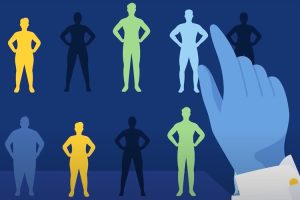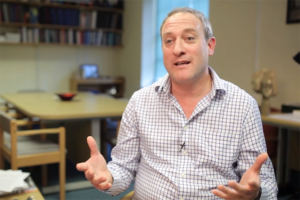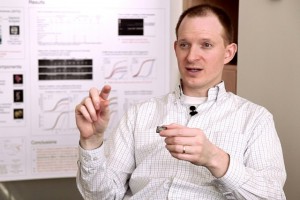Comparing genes and linguistic sounds across human...
Joint analysis of data on genomics, linguistics and geography leads to new insights into their interference
The twin research here at King’s College London that I’ve been running for the last 23 years is perfect for studying aging and aging-related diseases. This is because we have a wide range of age, from 18 to 96, and we’ve been following these twins for a long time – we have many longitudinal samples. These twins are the best-studied people on the planet: they’ve had about 30,000 pounds spent on each of them on average, massive sequencing of whole genome sequence, they have a five hour clinical visit every three years, they have thousands of blood tests, something called metabolomics, we look at all the metabolites in their blood, proteomics, epigenetics, gene expression, and all done sequentially. This allows us to look at biomarkers of aging because it’s pretty hard to study aging without understandings of the mechanisms.
We’re very much interested in slowing down the rate of aging. We found that we need a biomarker to see whether, for example, certain diet or certain lifestyle can actually reduce that rate of change, so that you can apply it. Otherwise, you have to wait for people to die. Then you want to do studies for 30 years. So, we’ve looked at a few of these, and we’ve done many publications. The first one we looked at was telomeres.
Telomeres are these little caps at the end of your chromosomes, a bit like a plastic on a shoelace. As you get older, they get thinner and thinner, and then eventually that cell will die. You can measure that quite accurately. We showed that they were a pretty good marker of biological aging. We also published that it was related to stress and social class. Even an obesity and cigarette smoking, so that we were able to work out, that if you were obese, you had an eight years less biological aging or you have eight years biologically older than if you weren’t obese, which is pretty similar to smoking. So, these were effective measures.
Everyone has a different biological age, and with colleagues in Croatia, we actually started a company called Glycan Age that would measure these commercially. I tested myself recently, so I think it’s a brilliant test. I turned out to be at least 10 years younger than I really am, so I’m a big believer. But we also tested some other people who are 10 years older than they thought they were. We got an interesting response. They were first rather angry and thought we’ve got the wrong result, and then, on closer examination, it turned out they were overweight, they didn’t exercise, and they didn’t have the right diet, it wasn’t as healthy as they thought, so they were be fooling themselves.
Some of these tests start off as a to make use of the research, but as an individual for working out a sort of snapshot of how you are doing. They can be quite useful in encouraging people to have healthier lifestyles. Although the error on this is never exactly precise, I think this is an area that’s going to get better and better, as we are able to summarize this big variation between people. I still see patients as a doctor, and when I see some 70-year-olds, they can look like the early 60s, and other 70-year-olds look like 85 – there is a huge variation. Trying to work it out, why that is and how we can prevent it, and make us all healthier, I think, is one of the big challenges for future.
There are many biomarkers of aging. First of all is to take a photograph of somebody, and look at their face, and count the wrinkles. The human eye is quite good at discerning how old someone is. We have done these experiments, and it’s a reasonable guide to visual biomarkers. Second, is a pretty good biomarker to shake someone’s hand or get them to do a squeeze grip strength. The grip strength is a very good indicator of your biological age, as well as certain mechanical tests. Then you have other blood tests. The crudest one was just measuring kidney function. Urinal tests go down with age. Then we have to measure blood telomeres, which are these caps on the end of your chromosomes, which you can measure through a genetic test.
Then you have mixing metabolites that change with age, called metabolomics. You have methylation, this is an epigenetic test, which is a very accurate way of seeing one’s age because these are the chemicals that switch your genes all off and it turns out these chemicals change quite rapidly with age, so you can gauge someone’s age just by looking at these chemicals. Lastly, glycomics, these very complex sugars, which are very individual in people, stick to all the proteins in your body and you can measure them now. The levels of them are a very strong indicator of age. We don’t understand why, but it clearly explains why our immune systems changed so dramatically with age. We’ve now got a wide range of all these markers that are proven useful.
There is something else as a microbiome, which interesting doesn’t change with age very dramatically until you get to 75, and then your diversity suddenly drops. It may be that that’s just before you get unwell. So, all of these things together. What’s exciting – and these are things that we can do in our twin study – looking at how these biomarkers compare to each other and how we can find genes for them, and try and understand mechanisms of aging, as well as using of the test ways to reverse or delay aging.
People ask me what’s the point of knowing your biological age if you cannot do anything about it – this is just bad news. In certain animals, there’s good evidence that you can slow down your rate of volatility, and the various stories about changing diets and intermittent fasting, and calorie restriction, which can do that. In humans, there is not yet long-term data, but we believe things like a glycan test can be improved if people go on diets and exercise, and generally improve their lifestyles.
I think an exciting point at the moment is that many of these tests have now become accessible to the public. So, you’re seeing an increasing range of tests public are able to do themselves, without their doctor, getting access to this technology maybe through apps or to other systems. I think the fact that people can test themselves, get a blood test or urine test, a test their gut microbes through the Internet is empowering people to take charge of their lives, and in a way realize that their doctors may not have all the answers anymore, and the old traditional model of waiting for some disease to happen is not the best way.
I’m seeing this more and more, when I’m going giving talks, that the public are hungry for this information, they want to do these tests, self-experiment, work out what diet suits them. I think this increasing array of ways of doing this that started with genetic testing, but we’ve realized that has its limits – moving towards testing and microbiome, testing your biological age, maybe doing other tests on foods. I think, there is a shift in the whole of medicine away from the traditional models and empowering the public in ways we haven’t seen before. They’ll then be able to get online advice and doctors in any country regardless of some restrictions, and this has enormous benefits. We obviously need to make sure the information given to these people is accurate.
I see that there are very big advantage of this whole personalized medicine movement, which is giving the power back to the individual, so the individual can work out how they can respond to a drug, are they going to side effects, what they do about it and then testing themselves before and after diets or lifestyle changes. I think we’re going to see in the next ten years very exciting changes that we hadn’t thought about, and areas of inside our bodies that again showing the complexity of the human body. That’s quite amazing, because we have 99% of the species of the microbes, what they do or what their genes do, and we’re just discovering all systems like these. So, they’re blank hands or the 30,000 immune cells in our bodies that work in so many complex ways we don’t understand. We started to realize why humans are so individual and also so flexible. It’s a very exciting time.

Joint analysis of data on genomics, linguistics and geography leads to new insights into their interference

Neuroscientist Neil Burgess on different types of memory, the H.M. patient case, and the role of hippocampus i...

Astrobiologist Christopher Carr on archaea and bacteria, possibly habitable planets, and life on Mars